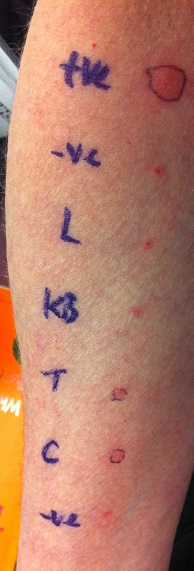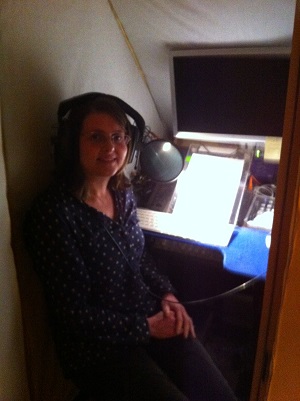The National Institute for Health and Clinical Excellence (NICE) have today published guidelines on diagnosing food allergy in children in a primary care and community setting. These are the first allergy related guidelines to be delivered and they aim to give information to health professionals in primary care on how to suspect and diagnose food allergy and when to refer on to a more specialist service.

The guidelines were launched today, Wednesday 23rd February 2011, and as expected there has been a good deal of media interest. It was covered on BBC Radio 4 and BBC Radio 5 Live today and I’m sure a lot more.
Find out more on the NICE website. Read: “Diagnosis and assessment of food allergy in children and young people in primary care and community settings”. Skin prick tests can identify allergies quickly and easily and really only take a few minutes to do.
The radio coverage warned against tests that are sold by online websites and health food shops which can give misleading results. I know from experience, and having tried these tests myself, that people are so desperate for a diagnosis that they’ll try anything. The problem with muscle tests and anything which isn’t testing a blood sample, is that you can get false postitives, ie. results show you are allergic to things you can quite happily eat without a problem. I took a test a long time ago and the results came up with six things correctly, which I do either have a severe allergy to, or a mild intolerance to, and five things which as far as I’m aware, I can eat without any problems. So I wouldn’t necessarily rule out these other tests categorically. Everything must be taken with a pinch of salt. The tests did help me identify one problem ingredient, celery, which is hidden in so many things, like stock cubes, sauces, soups etc. which I hadn’t realised I had a problem with. Now I am avoiding celery I have far fewer allergic attacks, and am now reintroducing it slowly into my diet.
The BBC have previously raised the issue that children may be wrongly being diagnosed with allergies in “Doubts raised over child food allergy rise”. This may well be the case, but scaremongering like this doesn’t help all the children who really do have allergies. Not many people would have a random test and then, based on nothing but the test results, avoid the recommended problem foods forever. Most people would test the results and try foods to see if they really were causing a problem. We can’t deny that allergies are on the rise so we shouldn’t make light of the issue, and these new guidelines will make such a difference for children and their parents who are seeking answers.
You’ll find another interesting article, “NICE warns of alternative allergy tests”, which is well worth a read. It explains the different tests that are on the market.
I really welcome these new guidelines. If I had a pound for every time I was told I couldn’t possibly be allergic to food I’d be rich. I’m so pleased that there is more awareness now about allergies and what can cause them. Granted, allergies are not necessarily always caused by food, but it can very often be a contributing factor.
What do you think about these guidelines? What help have you had from the NHS in diagnosing your allergies?












Hi Ruth,
I’ve just blogged about this myself, but I have to disagree on some points.
The problem with muscle tests is that there is no evidence they work. That they give false positives is not the problem at all – blood tests for IgE also can give false positives, and in the context of other diagnostic techniques these tests can still offer some value.
It’s that there is no evidence for their effectiveness and they are irreproducible. One tester will find a problem, another tester will not. This does not happen with bloods.
I’ve linked to your blog, by the way, and look forward to reading and discussing more!
All the best, Alex
Hi Alex. I agree about the muscle tests. I’ve had these tests done, and they somehow do seem to work. Is there where you can’t raise your arm when holding a phial of the allergen? I also had some NAET tests done and gave up when I saw how long the list of stuff they wanted to treat me for was. I’m not made of money. I think where misconceptions arise is where many tests are done and based solely on these results people think they’ve got an allergy. They may only have an intolerance, which is quite different and nothing is ever that simple. I can have quite a bad reaction to something one week and be fine the next time I eat it. It all depends on so many things, stress levels, immune system balance, what other things you eat at the same time. To read Alex’s blog post about the same subject here’s the link: http://foodallergyandintolerance.blogspot.com/2011/02/nice-allergy-uk-food-allergies-and.html
Hi Ruth!
But… what do you mean they ‘seem’ to work? That they seemed to work for your case? Thing is – that isn’t proof. If my stars are right today it doesn’t prove astrology, and if you pick the winning lottery numbers tomorrow it doesn’t prove your predictive psychic powers.
I have to disagree about the misconceptions. Problems arise when alternative therapists make claims about their unproven testing modalities and treatments for which there is zero (and I mean zero) evidence – be it allergy/intolerance or whatever. NAET should be avoided totally, I think.
Thanks for the link – and the comment on my blog! I think this may have inspired another post which I need to think more on!
Alex.